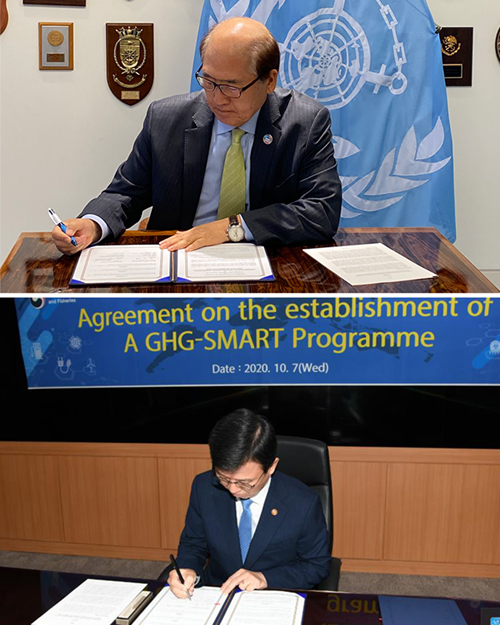
The Republic of Korea and the International Maritime Organization (IMO) have signed an agreement to establish a four-year training programme to support developing states to reduce greenhouse gas (GHG) emissions from shipping. The creation of a new training programme coincided with South Korea’s carbon neutrality pledge announcement.
On 27 October, Kitack Lim, IMO Secretary-General and Seong-Hyeok Moon, Minister of Oceans and Fisheries of the Republic of Korea, signed the agreement for the $2.5 million Sustainable Maritime Transport Training Programme (GHG-SMART).

As explained, the training programme will facilitate the implementation of candidate measures to be adopted by IMO and the development of national action plans to reduce GHG emissions from the shipping and ports sectors. It will be funded through an allocation of US$2.5 million under the existing memorandum of understanding (MoU) between IMO and South Korea on the latter’s contribution to the Delivering Strategy and Reform – Voyage Together Trust Fund (DSR-VT TF).
The GHG-SMART will focus on least developed countries (LDCs) and small island developing states (SIDS). It will help them to develop their capacity to achieve the goals set out in the Initial IMO Strategy on Reduction of GHG Emissions from Ships. The strategy envisages reducing total annual GHG emissions from ships by at least 50% by 2050 compared to 2008, meaning a reduction in carbon intensity for individual ships and a move to new technologies and low/zero carbon fuels.
The strategy recognizes that there are potential barriers to achieving the targets and highlights the need for supportive measures, including capacity building, technical cooperation, technology transfer and research and development (R&D), particularly in developing countries.
The four-year GHG-SMART programme will, therefore, support states to address gaps in technologies and policies, by building knowledge and capacity in those countries to identify ways to effectively implement measures contained in the IMO Strategy. This would be complemented by support and training to develop and implement national action plans. National action plans may facilitate the implementation of IMO-adopted measures in the national context and support the achievement of international commitments through national action.
“If we are to achieve the goals in the initial IMO strategy, then we must ensure that no country is left behind in the transition to carbon-neutral shipping… This training programme will greatly enhance the implementation of the Initial IMO GHG Strategy, especially when it comes to building knowledge and capacity in SIDS and LDCs,” Lim commented.
“The Republic of Korea is fully supportive of the Initial IMO Strategy on reduction of GHG emissions from ships and the emphasis on its “Voyage Together” approach. The Government of the Republic of Korea hopes that this GHG SMART training programme will be the beginning of a concerted effort to assist the SIDS and LDCs with the implementation of the IMO strategy,” Moon said.
GHG-SMART training and capacity building
Training packages will be developed to cover a range of activities, including analysis and review of current policies, update on IMO regulations, how to develop national action plans, training of trainers to implement specific measures such as data collection, sharing of information and best practices.
It is envisaged that participants will come from a range of different stakeholders, including policy makers, public authorities and industry (shipping, ports and ship building).
The training will also facilitate transfer and uptake of energy-efficient technologies, filling gaps in technology and policies between developed countries and the LDCs and SIDS.
Link with other IMO-executed GHG emission reduction projects
The programme will be strategically linked to the ongoing and proposed major projects implemented by IMO to achieve GHG emissions reduction. These include the Global MTTC Network (GMN) project and the GreenVoyage2050 project.
There will also be cooperation with the World Maritime University (WMU) for technical input, and IMO’s Integrated Technical Cooperation Programme (ITCP).
South Korea announces carbon neutrality pledge
Following Japan, South Korea has become the latest Asian economy to announce its net-zero carbon emissions pledge.
“South Korea’s announcement follows Japan’s recent pledge to become a carbon-neutral society by 2050. Both countries have similar fuel mix with 80% share of hydrocarbons in primary energy supply. Renewables (ex-hydro) is under 2% while nuclear takes up 15%. The goals are hugely aspirational and daunting,” Prakash Sharma, Wood Mackenzie Asia Pacific Head of Markets and Transitions, noted.
“South Korea also plans to phase out nuclear and shut down coal-fired power plants longer term. However, the timeline is not clear. This means a deep decarbonisation in South Korea will rely on faster adoption of new technologies. LNG will likely play a crucial role in South Korea’s transition.”
“In our scenario modelling for South Korea, electrification expands rapidly and is increasingly supplied by renewables, battery storage, hydrogen and carbon, capture and storage (CCS). The transport sector becomes fully decarbonised by 2050 using electric vehicles and fuel cell vehicles. Share of hydrocarbons is expected to fall to approximately 40% by 2050.”
“South Korea has an advantage. It already has an established emissions trading scheme in place. This is an important mechanism to deliver the changes required in the power and industrial sectors on the basis of cost and carbon, to reach net-zero in emissions. Carbon price levels in South Korea currently hovers around US$30 per tonne. We expect it to increase to upwards of US$100/t in order to deliver a net-zero emissions outcome,” Sharma concluded.
The post South Korea initiates programme with IMO to cut ships’ GHG emissions, announces carbon neutrality pledge appeared first on Offshore Energy.
